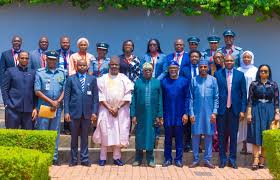
Two months after the Federal Government launched the National Single Window (NSW) project, freight forwarders in Nigeria have voiced their disappointment, citing a lack of tangible progress in the initiative meant to streamline trade processes.
Despite the ambitious promises made during its inauguration by the Minister of Finance and Coordinating Minister for the Economy, Mr. Wale Edun, stakeholders in the sector, particularly freight forwarders, say the NSW has yet to make any significant impact on trade facilitation.
Recall that on August 21, 2024, during the National Single Window Project kickoff Workshop in Abuja, Mr. Edun described the project as a transformative initiative aimed at simplifying trade procedures, reducing bureaucratic delays, and promoting transparency.
He expressed optimism that the NSW would enhance Nigeria’s trade environment and unlock unprecedented economic growth. However, stakeholders argue that the initiative is already facing severe obstacles, primarily due to their exclusion from the process.
However, lamenting lack of progress two months after the ceremony, Dr. Kayode Farinto, the former acting President of the Association of Nigerian Licensed Customs Agents (ANLCA), criticized government’s approach to the NSW, stating that the project was “dead on arrival” because key stakeholders like freight forwarders were not involved in its design. “You cannot have a single window when you are not including freight forwarders. No professionals, no technocrats. They set up a committee from various ministries and expect to drive a single window. How possible is that?” Farinto lamented.
He further argued that the federal government’s exclusion of freight forwarders from the planning process undermines the effectiveness of the initiative. “We are supposed to be involved, offering constructive criticism to ensure the system works efficiently,” he said, emphasizing that the experience and advice of freight forwarders are crucial for the success of the NSW.
He also raised concerns about customs not being in the driver’s seat for the project. “Customs should be leading this initiative. Without their active involvement, the project will fail to gain traction,” he noted. According to him, the lack of a robust platform for freight forwarders to engage with the NSW system reflects a lack of genuine progress, with no visible changes since its inauguration.
Echoing Farinto’s sentiments, Mr Frank Obiekezie, President of the Association of Registered Freight Forwarders of Nigeria (ARFFN), said there had been no visible improvement in the NSW process. “There has not been any change. We expected some form of information, education, or enlightenment about the system, but there has been nothing,” Obiekezie remarked, adding that stakeholders like freight forwarders were not given the necessary tools or training to operate within the NSW framework.
On his part, Stanley Ezenga, a chieftain of the National Association of Government Approved Freight Forwarders (NAGAFF) noted that while the NSW was intended to improve operational efficiency, the system has not been functioning as anticipated. “The idea of having all stakeholders—Customs, SON, NAFDAC, and others working on a single platform is not new. But for the NSW to work, it needs to be perfected and properly implemented,” Ezenga said.
Meanwhile, at a recent event in Lagos, Mr Dele Oye, the National President of the Nigerian Association of Chambers of Commerce, Industry, Mines, and Agriculture (NACCIMA), had emphasized the importance of private sector involvement in the success of NSW. Speaking at the Nigerian Export Hub (NEXHUB) Export Conference, Oye appealed to the federal government to increase private sector participation in the steering committee driving the project.
Oye however commended President Bola Tinubu for initiating the National Single Window project, but stressed that its success depended on inclusivity and collaboration with key stakeholders, including the private sector.
“The composition of the steering committee should capture the private sector, which is essential to actualizing the government’s trade policies. Only through collaboration can we ensure the project’s success,” he stated.















